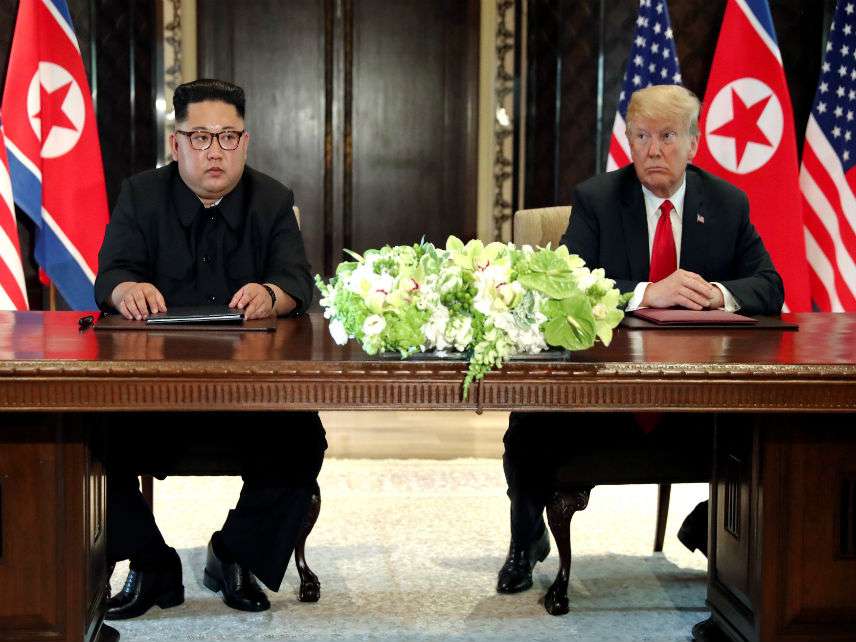Trump's Foreign Policy: There Is No Good or Bad, Right or Wrong. There Is Only Trump.
Solipsism is his only guiding principle.
Peace is better than war, obviously. So everyone should breathe a sigh of relief that President Trump ended months of

brinksmanship and shook hands this week with North Korean dictator Kim Jong Un, at least temporarily dampening the risk of potential nuclear catastrophe.
But does anyone doubt that if President Obama had negotiated this exact same deal with the Hermit Kingdom, Trump would have berated it as "weak" and "terrible"?
This gets to the heart of Trump's approach not just to foreign policy, but all politics: It's all about him. There is no guiding ideology beyond Trump. If he does it, it's great, the best. If his opponents do it, it's weak, foolish.
Indeed, the Trump foreign policy doctrine is not, as a senior White House official recently put it to The Atlantic's Jeffrey Goldberg, "We're America, Bitch."
It's "I'm Trump, Bitch."
This president doesn't care what's in the deal—only that he's the one striking it. There is no good or bad, right or wrong. There is only Trump.
With or without Trump, the North Korea thaw ought to be received positively. Shunning murderous dictatorships isn't a good way to curb their human rights abuses at home or their provocations abroad. That only isolates them from the broader world, cutting them off from global norms of good behavior. It also diminishes the international community's leverage to influence them. Indeed, it would be an advance for good sense and humanity if the United States were to end all sanctions against bad regimes and open embassies in their countries, including North Korea. However, dealing with tyrannical regimes is one thing. Feting and flattering them as Trump did with Kim is quite another.
This was a stunning—and swift—legitimization of a rogue regime that has no parallel in living memory (or perhaps ever). President Barack Obama traveled to Cuba when he ended America's half-century embargo on the country and opened an embassy there, but he didn't heap fulsome praise on the Castro brothers' communist dictatorship. Nor did he hold hands with the Iranian mullahs against the backdrop of fluttering Iranian and U.S. flags and issue a joint communiqué. You can imagine what citizen Trump would have tweeted had President Obama acted this way.
This is about more than hypocrisy, though. It's the way Trump views life and the world. The most unlikely president in American history can do no wrong, and nothing is more paramount than dominating and belittling his opponents. Trump looks out upon all the people of the world, the "haters and losers" chief among them, the people who say he can't succeed, that he will fail in doing things his own way, and says, with a sort of swollen bravado, "I'm Trump, bitch."
But in the end, Trump's deal with Kim will very likely be a weaker, vaguer, and less-binding version of the Obama-era Iran deal that Trump tore up in May after mercilessly berating it as "too weak." Indeed, Obama's Iran deal forced the mullahs to give up 98 percent of their uranium. North Korea hasn't even made full disclosure of its arsenal, and yet Trump has declared that it is no longer a nuclear threat. Trump has slammed Obama for giving billions of dollars is cash to Iran, except that it was Iran's own money. Trump, in contrast, has already unilaterally declared that America will no longer conduct war games with South Korea because that is too provocative for North Korea. The difference between America's concessions to Iran versus North Korea is, of course, that in the latter case it's Trump making them.
Trump's North Korea deal will likely be no stronger than the 1994 deal that President Bill Clinton signed with Pyongyang and arguably a whole lot weaker than the 2005 framework that the Bush administration signed. (The latter actually required North Korea to "abandon all nuclear weapons and existing nuclear programs.") It would be foolish to believe that this time it will work.
But Trump really does seem to believe it—because he believes in nothing but himself. He has no guiding ideology here, no doctrine, even one that puts American force and confidence at its center, as his (misguided) hawkish advisers like John Bolton do. There is only Trump.
Of course, it is not only the deals that previous administrations have signed with America's foes that Trump is taking a sledgehammer to. He is also smashing those with America's friends. Trump feels no loyalty to any of America's alliances or commitments—historic or new.
He has regularly panned the NATO alliance and America's security assurances in Southeast Asia. He is torpedoing the G-7 alliance, created expressly to strengthen trade ties between the world's industrial powers. He pulled out of the Obama-backed TPP trade agreement and the Paris climate accords. He has contempt for the Clinton-era World Trade Organization and, of course, NAFTA, which he bewilderingly blames for economic "carnage" in America.
Trump is spectacularly wrong about some of this—but not all of it. The problem, however, is that he doesn't have a moral compass besides his own ego to guide him. The rightness or wrongness of the deal doesn't matter to him. What matters is that he didn't author it. It is solipsism disguised as policy.
Most presidents aspire to leave the world a better place. Not too many succeed, of course, but when it comes to this administration, that isn't even a yardstick. Every day that Trump does not blow up the world seems like a victory. And just for that alone, we should be grateful for his handshake with Kim.
This column originally appeared in The Week.


Show Comments (185)